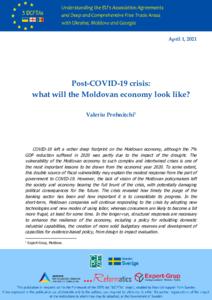
Post-COVID-19 crisis: what will the Moldovan economy look like?
COVID-19 left a rather deep footprint on the Moldovan economy, although the 7% GDP reduction suffered in 2020 was partly due to the impact of the drought. The vulnerability of the Moldovan economy to such complex and intertwined crises is one of the most important lessons to be drawn from the economic year 2020. To some extent, this double source of fiscal vulnerability may explain the modest response from the part of government to COVID-19. However, the lack of vision of the Moldovan policymakers left the society and economy bearing the full brunt of the crisis, with potentially damaging political consequences for the future. The crisis revealed how timely the purge of the banking sector has been and how important it is to consolidate its progress. In the short-term, Moldovan companies will continue responding to the crisis by adopting new technologies and new modes of using labor, whereas consumers are likely to become a bit more frugal, at least for some time. In the longer-run, structural responses are necessary to enhance the resilience of the economy, including a policy for rebuilding domestic industrial capabilities, the creation of more solid budgetary reserves and development of capacities for evidence-based policy, from design to impact evaluation.